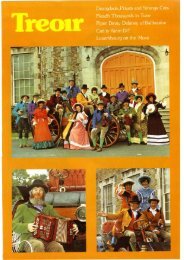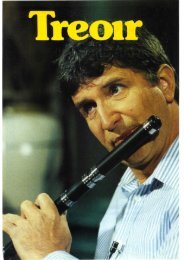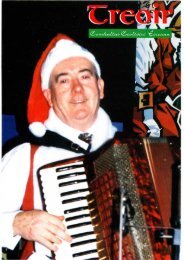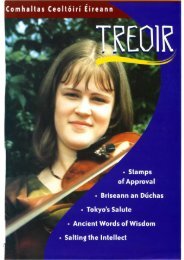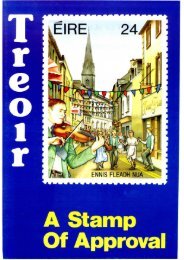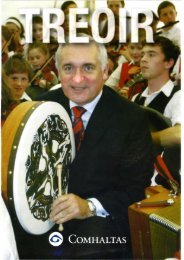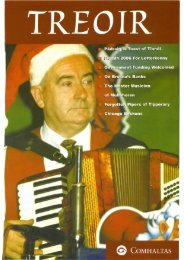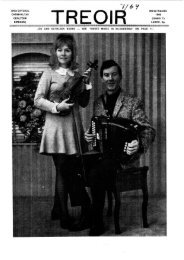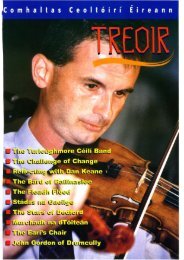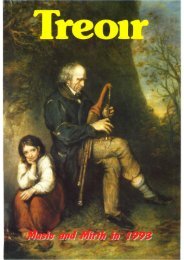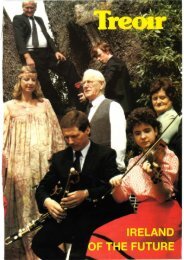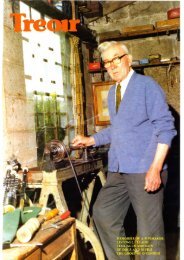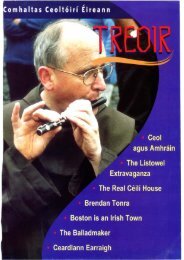Create successful ePaper yourself
Turn your PDF publications into a flip-book with our unique Google optimized e-Paper software.
Joe O'Dowd, Sligo Fiddler<br />
Dr. Edward O. Henry, San Diego State University CA 92182<br />
Driving into Sligo from Manorhamilton, the rolling hills gave way to a valley<br />
with forested slopes and farmed bottom, its roughly rectangular green and gold<br />
patches separated by tree-lined lanes. A stream widened into the shimmering<br />
Glencar Lake and the slopes grew into low mountains that opened to the sea, the<br />
pregnant silhouette of Benbulben to the right and across from it, the towering<br />
green Killogyboy, dotted with distant sheep. Then the town's narrow streets<br />
and a brick bridge with cloth-capped old men, a swan serene on the stream with<br />
a cathedral spire behind. A hand-lettered poster on a telephone pole in the busy<br />
town centre announced an Irish music session at the Sligo United Trades Club on<br />
Castle Street that night. That's where we met fiddler Joe O'Dowd.<br />
Joe O'Dowd was born into a musical,<br />
family in 1914 at Knocknaska, Gurteen,<br />
about twenty miles from Sligo city in<br />
County Sligo. His older brother, who<br />
died a few years ago in New York,<br />
helped him start with the fiddle, when<br />
he was twelve or thirteen. Joe's uncle,<br />
John O'Dowd (who died in the early<br />
years of this century) had been a widely<br />
recognised fiddler and had two<br />
well-known reels called after him :<br />
"O'Dowd's Favourite," recorded by<br />
Michael Coleman in the 1920s and the<br />
other "O'Dowd's Number Nine," later<br />
recorded by Hugh Gillespie.<br />
When J oe began to play, only a<br />
limited number of people admired the<br />
music and would travel to hear it;<br />
people are more interested in hearing<br />
and learning the music today. The<br />
music was played chiefly at social gatherings<br />
in country homes and the<br />
musicians were not compensated. ("If<br />
you got a cup of tea you were lucky.")<br />
J oe looked forward to such occasions in<br />
part because he could learn a few things<br />
by watching the musicians. Later, he<br />
was a fan of Michael Colemans, and, as<br />
J oe always played by ear, and could<br />
pick up a tune quickly, he learned a<br />
good deal of his music by listening to<br />
Coleman's records. Coleman and Joe<br />
came from the same part of County<br />
Sligo.<br />
As a young man Joe had no job,<br />
except helping out on his father's small<br />
farm . So when he was asked by a promoter<br />
to perform at the Garryowen<br />
Club in Hammersmith, London, he decided<br />
to have a go at it. It was to be his<br />
first job as a professional musician.<br />
The band in which he played there<br />
from about 1935 to 1940 included<br />
Martin Wynne on fiddle; Paddy Taylor<br />
(of Limerick) on flute; a man who<br />
12<br />
played tenor saxophone (for waltzes) as<br />
well as flute and piccolo; one who<br />
played alto saxophone as well as fiddle ;<br />
a piano player ; and a drummer.<br />
Referred to as a ceili and old time band,<br />
they played to crowds of several<br />
hundred dancers on Wednesday nights<br />
and up to six hundred on Saturday and<br />
Sunday nights- usually more women<br />
than men, with quite a number of Irish<br />
nurses, Joe recalls. The band also did<br />
some radio broadcasting. Most of the<br />
tunes they played are those currently<br />
played in the Sligo <strong>Comhaltas</strong> sessions<br />
(see below).<br />
With the onset of the war J oe returned<br />
to Ireland. In 1942 he began working<br />
for Irish Life Assurance Company in<br />
Ballymote, some miles south of Sligo<br />
city. He · was transferred to S'ligo in<br />
1948, but didn't play much in public<br />
until 1954, when he started the Owenmore<br />
Ceil{ Band. (Owenmore is the<br />
name of a river in County Sligo). In<br />
that band besides J oe were Henry<br />
Dwyer and Paddy McDonagh (fiddle);<br />
Thomas Collis (flute); Jerry Fallon and<br />
Thomas O'Dowd (accordian); Michael<br />
Feeney (piano); and John ScanIon<br />
(drums). The band travelled aorund the<br />
country a good bit, playing eight-hand<br />
and four-hand dances as well as the old<br />
time waltzes to crowds of several hundred<br />
in the parochial halls. (A band<br />
which includes two of the original members,<br />
Henry Dwyre and Thomas Collis,<br />
may be heard on the LP recorrlcalled<br />
The Owenmore Ceili Band, Harp<br />
Records HPE 662, distributed by Pickwick<br />
Records Ltd. of Dublin).<br />
Joe continued working as a life<br />
insurance salesman through this period<br />
"Music was a good side line," With the<br />
waning of the ceili band era the band<br />
stopped playing in 1965. The Irish<br />
JOEO'DOWD<br />
music scene shifted to the pubs- prior<br />
to that there hadn't been much music<br />
played in pubs or cabarets.<br />
J oe plays today for dancing contests<br />
as he has for some twenty years . He<br />
also judges at music contests in England<br />
and Ireland and is a central figure in the<br />
Sligo branch of <strong>Comhaltas</strong> Ceolt6irl<br />
Eireann. <strong>Comhaltas</strong> is a nation-wide organisation<br />
dedicated to the support of<br />
traditional Irish music, with branches in<br />
many other countries.<br />
The Sligo branch of <strong>Comhaltas</strong><br />
started around 1958. Joe tells how at<br />
first there was much emphasis on<br />
organisation and procedures; it subsequently<br />
lapsed for a few years. But<br />
with the leadership and labour of J oe<br />
and another musician; Ms. Carmel<br />
Gunning., it restarted in 1973. One of<br />
<strong>Comhaltas</strong> institutions is a nationwide<br />
system of contests. J oe notes that contest<br />
judges anywhere tend not to be universally<br />
admired for their decisionsthere<br />
may be a tendency to favour<br />
popular styles and to award previous<br />
winners. But whether the talk is bad or<br />
good, the talk itself is a sign of interest<br />
and activity.<br />
The Sligo branch of <strong>Comhaltas</strong> meets<br />
each Tuesday at the Sligo United Trades<br />
Club on Castle street, and in the<br />
summer of 1984 was also playing one



